Russian Investment in Overseas Property: Analytical Report by Tranio.com (2013)
Analytical Research
Conducted by the Tranio.Ru Internet Center of Overseas Property
2012
In March 2012, the Tranio.Ru Internet Center of Overseas Property investigated who Russian overseas property buyers are. We relied on the results of an online survey we conducted, which included more than 200 agencies and private realtors.
The purpose of this study was to determine who constitutes the bulk of
This is the second piece of analytical research conducted by Tranio.Ru. The first one was devoted to overseas property sellers and published in December 2011.
- 2.1.
- 2.1.1.
- 2.1.2.
- 2.1.3.
- 2.2.
- 2.2.1.
- 2.2.2.
- 2.1.
- 3.1.
- 3.1.1.
- 3.1.2.
- 3.1.3.
- 3.1.4.
- 3.1.5.
- 3.2.
- 3.2.1.
- 3.2.2.
- 3.2.3.
- 3.1.
- 4.1.
- 4.2.
- 4.3.
- 4.4.
- 5.1.
- 5.2.
1. Survey Respondents
The survey included 202 respondents — both representatives of foreign property agencies and private realtors.
The participants in the survey sell properties in 43 countries, 7 of which have a dominant position. Here is the proportion of respondents offering houses and apartments in the following countries:
| Turkey | 15,9% |
|---|---|
| Bulgaria | 14,6% |
| Spain | 13,8% |
| Italy | 13,0% |
| Montenegro | 11,0% |
| Germany | |
| Latvia |
The top ten dominant countries also include France (6.5%), Greece (6.1%) and Cyprus (5.7%). The remaining countries are Lithuania, the UK, USA, Czech Republic, Egypt, Hungary, Finland, and Thailand.
Most realtors (83.5%) reported that Russian buyers constitute the majority or at least a significant portion of their clients. Many partners of Tranio.Ru have noticed an increase in the number of buyers from Russia and the former USSR in recent years.
2. Buyer Profile
2.1. Who buys overseas property?
The most typical buyer of overseas property is an entrepreneur — a man older than 30 (and usually younger than 45), who is married and has children. He is most probably making a purchase for the first time.
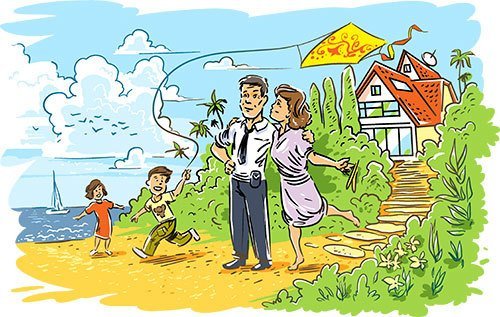
2.1.1. Occupations
Respondent agencies and private realtors were asked to specify one or more key categories of buyers’ occupations.
The vast majority of them (91.2%) reported that the main group of their customers is comprised of entrepreneurs and business owners. This rate is slightly lower (76.9%) only in Bulgaria, where property costs are cheaper than in other popular countries. This is why the share of buyers who do not run their own businesses is larger.
On the contrary, absolutely all respondent property sellers in Montenegro reported that entrepreneurs constitute the biggest category of buyers.
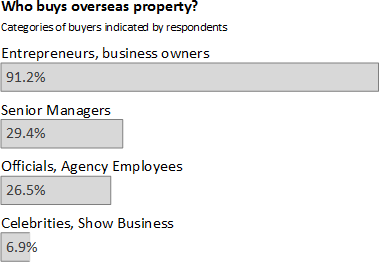
The realtors also reported these minor categories:
- Senior Managers — on the whole, this audience was reported by 29.4% of the respondents, although in Spain it made up 46.2% and in Italy it was reported only by one respondent.
- Government Officials, Bureaucrats (26.5%). This group is especially noticeable in Montenegro (40.0%) and is almost
non-existent in Germany (reported by only one respondent).
According to Tranio.Ru estimates, the real proportion of such officials among Russian property buyers is higher. However, most of them tend not to disclose their occupations to realtors. - Show Business, Athletes, Models (6.9%). This category is particularly strong in Latvia (20.0%), which is not surprising as this country hosts numerous festivals and concerts geared towards the
Russian-speaking audience. Many Spanish realtors (19.2%) also reported a significant number of celebrities among property buyers.
2.1.2. Demographic Characteristics
Nearly half of the respondents (48.8%) indicated that men are those most likely to purchase a property. About
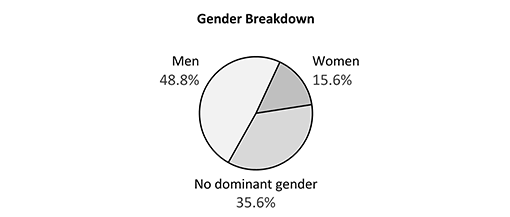
Most buyers are
A noticeable number of clients over 45 years was reported by 57.9% of realtors. 25.2% of this group was their primary audience.
Finally, very few sellers (5.4%) are dealing with buyers under the age of 30.
In some countries, the senior age category slightly prevails over
A steady majority of respondents (85.1%) indicated that families, usually those with children, are prevalent among their buyers.
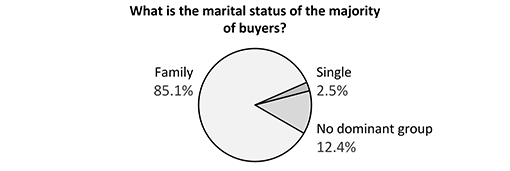
2.1.3. Returning Buyers
Nearly
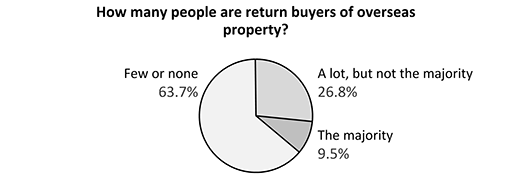
On the contrary, many realtors from Latvia, Germany, and Montenegro reported a significant number of returning buyers — 76.9%, 69.2%, and 50.0%, respectively. These buyers are primarily interested in investments: they buy property for resale or leasing and not only for private use.
2.2. Buyer Competence
2.2.1. Foreign Languages
Half of the respondents (49.8%) indicated that very few buyers speak foreign languages. The most noticeable country in this respect is Bulgaria, where 70.4% of realtors admitted that Russians prefer to speak their native language. This is not surprising as the Russian and Bulgarian languages are quite similar, so it is easy for them to understand each other.
Conversely, sellers from some countries reported that a significant amount of their clients (though not the majority of them) speak foreign languages, primarily English. This is typical for Montenegro (noted by 66.6% of local realtors), Turkey (64.2%), and Italy (61.2%). The market in Italy is not so much focused on
Some realtors point out that a significant number of their clients speak not only English, but German and French as well, especially among buyers in Germany and France.
2.2.2. Knowledge in the Field of Property
Participants in the survey say that they have to deal with buyers of different competence levels — from poorly oriented to the property market to true professionals. Most (59.0%) respondents indicated that no category substantially prevails. At the same time, 24.9% reported that their clients are generally well versed in the subject, and only 16.1% replied that, conversely, the majority of their clients are not very savvy in this field.
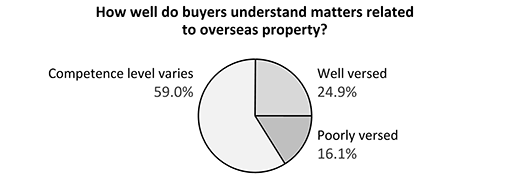
Low competence of buyers is more pronounced in Germany and Italy, where it was noted by 28.6 and 27.8% of respondents, respectively. These countries have complex professional legislation and have developed
Conversely, there is a high level of competence among property buyers in Latvia: this was disclosed by 53.3% of realtors. This indicator is also above average in Bulgaria — 37.0%. Bulgarian realtors actively use advertising and other channels of communication to disseminate information about their activities and conditions on the local property market, relaying to potential buyers a lot of useful information.
Respondents noted that property buyers get information primarily from the Internet, and it is not always relevant and reliable. Here are some typical comments from realtors:
- “Many buyers have distorted information about the crisis in the EU. There are many unscrupulous sellers on the Internet who confuse and misinform concerned buyers.” (Elena Gryzlova, CEO Dom Estate, Spain)
- “Buyers are not fluent in relevant laws.”
- “As a rule, people want to buy
solid-cast brick houses, but only few can tell the difference betweensolid-cast and frame houses.” (Damian Khristov, property consultant, Bulgaria) - “The arrangements for payment terms and maintenance are often made quickly and hastily. It suits the seller, but creates problems for buyers.”
3. What property do Russians prefer?
3.1. Types and Features of Property

3.1.1. Holiday and Urban Property
The vast majority of realtors (80.9%) indicated that the majority of buyers is interested in holiday accommodation, especially close to the sea. The rest of them (19.1%) reported that buyer interest lies in property in big cities — capitals and business centers.
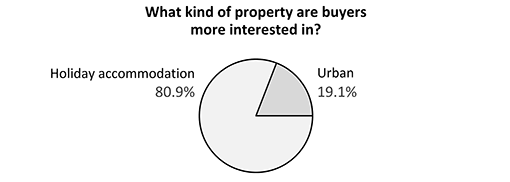
Holiday accommodation is a particular priority in Turkey: none of the respondents noted that buyers are concerned about other types of property. The situation is similar in Spain, where 96.0% of respondents reported that Russian buyers of overseas property prefer holiday accommodation. Germany reveals a totally opposite picture: 92.3% of respondents pointed out that Russians mostly buy property in big cities. Unlike most of the trends popular among
France and Italy are the countries where the
3.1.2. Apartments and Houses
More than
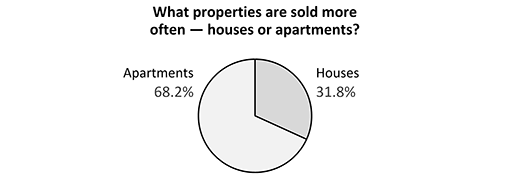
Flats and apartments in apartment complexes are more popular than separate housing (houses, villas). Apartments are especially in demand in Turkey, Bulgaria, and Latvia, where this type of property was indicated by 92.9%, 88.5%, and 78.6% of realtors respectively. There are a lot of
3.1.3. Primary and Secondary Property
In general, there is no pronounced prevalence of primary or secondary property: 55.1% of sellers noted that more buyers are interested in
However, the situation varies considerably from country to country. Primary property prevails in Bulgaria and Turkey, where it was noted by 88.5% and 71.4% of respondents, respectively; Latvia and Montenegro also stand out in this respect (69.2% in both). There has been a lot of housing built in Bulgaria and Turkey during recent years that is offered for sale with good conditions. Latvia sells a lot of properties built before the crisis.
Meanwhile, the market is dominated by secondary property for sale in Italy, which was indicated by 82.4% of realtors.
There is a high proportion of secondary property in Germany and Spain, too (76.9% and 76.0% respectively). In Spain many properties built during the boom of the 2000s are being resold. In addition, banks offer a lot of objects forfeit from insolvent debtors. In Germany, new facilities are built to a smaller extent, but a significant place on the market is occupied by buildings constructed many decades ago. In Italy, a few new buildings are under construction, too, due to certain difficulties in obtaining permits for construction work.
Russians are not very much interested in buying property in the construction phase
On the other hand, in Bulgaria, nearly half (46.1%) of realtors noted a sizeable proportion of buyers willing to purchase property in the construction phase.
3.1.4. Property Costs
Buyers are primarily interested in objects that fall in the lower price range: more than half of survey participants (56.1%) indicated that the majority of sales are for properties which cost up to US $150,000. Only 13.6% of them observed a significant, though not a predominant, share of sales in the segment over US $500,000.
The upper price range is especially common in Italy: 47.1% of realtors noted a significant share in deals above US $500,000. The average price category (US $150,000 – $500,000) is predominant in Latvia, where it was indicated by 92.9% of survey participants, and is noticeable in Spain as well (65.4%). The lower segment dominates in Bulgaria and Turkey, where the category of up to US $150,000 was reported by 96.2% and 92.9% of respondents respectively.
3.1.5. Mortgage and Installments
Nearly two-thirds of respondents (60.6%) reported that there is a significant share of buyers who want to purchase property with credit or in installments. 23.3% of respondents reported that more than half of all their clients are interested in loans.
However, as in the case concerning primary and secondary property, the situation varies from country to country.
In Latvia, the vast majority (91.7%) of realtors say that almost no one is interested in loans. This is due to the fact that after the crisis Latvian banks have tightened their requirements for borrowers and raised rates. Alexander Sviridov, senior broker of
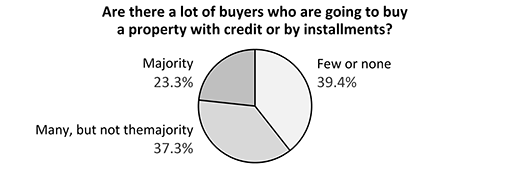
On the contrary, a significant (though not dominant) share of purchases with credit is noted in Italy, Spain, and Turkey: this option was chosen by 58.8%, 52.0%, and 50.0% of the respondents respectively.
Almost half (45.9%) of sellers reported that buyers are almost always willing to take a mortgage or credit and are approved, especially in Spain (76.2%) and Turkey (73.7%). Banks in these countries are willingly give credit to Russians, minimizing formal verification and bureaucratic procedures. On the contrary, in Germany, 55.6% of the realtors said that clients wanting to obtain credit rarely succeed because the procedure is stricter and banks are more demanding of potential borrowers.
3.2. Why buy overseas property?
3.2.1. Reasons for Purchase
We asked the participants in our survey to give one or more major reasons motivating
The most popular purpose was recreation and entertainment (71.5% of realtors gave this response). This reason lead by a large margin, especially in Bulgaria, where it was selected by 85.2% of the respondents. It is also considerable in Latvia (84.6%) and Turkey (82.1%).
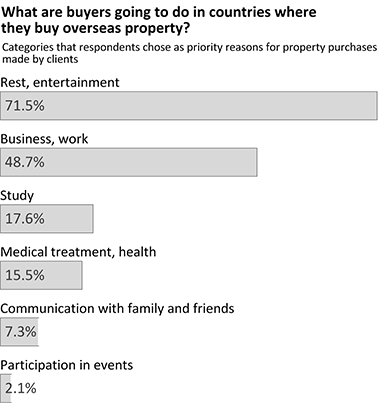
Conversely, in Germany, only 18.2% of all respondents reported that property is purchased for recreation; the most popular option here is business and work (90.9%). In Montenegro, business affairs are as popular as recreation: these two options were mentioned by 69.2% of the local realtors. Dilara Khairutdinova, sales manager at Foresight Montenegro, said: “Many Russian buyers are interested in the possibility of starting their own businesses. There are hotels
Spain is the country where business and work serve as the main purpose for buying property: this option was noted only by 33.3% of sellers.
The third most popular option is studying in local educational institutions: it was selected by 17.6% of the respondents. This was often noted by realtors in Germany (36.4%) and Spain (33.3%). There are many historic universities in Germany that have traditionally attracted students from all over the globe. Spain has many modern schools with
The fourth place was taken by medical treatment and health maintenance. This option was chosen by 15.5% of survey participants. This purpose was often seen in Spain (20.8%), while in Latvia it is not that significant (7.7%).
A significant number of buyers purchase property to lease it out. Almost half of the respondents (47.1%) indicated that many of their clients, though not the majority, use purchased property this way. This category is prevalent in Germany: 45.5% of sellers reported that more than half of all their buyers were going to lease out their property. On the contrary, this practice is less common in Italy, where 43.8% of sellers have indicated that there are almost no buyers of this kind. The situation is similar in Latvia and Montenegro (41.7% in both).
3.2.2. Temporary and Permanent Residence
Many Russians and other citizens of the former USSR buy property to live there on a
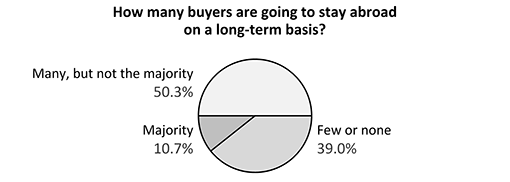
There are many buyers who consider
The majority of those who are going to settle in another country are going to move to a permanent place of residence (this option was chosen by 75.3% of the respondents). The others plan to stay for business or work.
Most (78.7%) respondents indicated that a relatively high proportion of clients buy property with expectations for the future. This practice is prominient in Bulgaria (96.2%) and Germany (90.9%).
Almost all Bulgarian realtors (94.7%) say that people who buy property do so looking towards the future — essentially taking up permanent residence. As a rule, they plan to do so after retirement (81.8% of respondents). Among
On the other hand, those who buy property in German regard it as a “reserve airfield” should there be a necessity to emigrate from Russia in the future. (This option was chosen by 60.0% of German sellers.)
Seniors also prefer Turkey for living, though to a much smaller extent than Bulgaria (this option was selected by 52.6% of Turkish property agents). Latvia is also a popular country that is regarded as a “reserve airfield” (75.0%).
3.2.3. Property for Family and Friends
More than half of respondents (58.5%) reported a significant category of buyers who purchase property for their relatives and friends rather than for themselves. This segment is particularly large in Bulgaria (84.6%) and Montenegro (83.3%).
Almost half of respondents (48.0%) said that in such cases people buy property mainly in order to settle their children there, and 44.9% — their elderly parents. Accommodation for children is most often referred to by realtors in Germany and Spain (71.4% and 60.0% respectively), as well as in the UK. Buying property for parents is more popular in Bulgaria (60.0%).
Natalia Kovalyova, General Director of Real Estate Services, said: “Education at the UK School in Thessaloniki (Greece) costs
By contrast, in Latvia and Italy, most realtors (75.0% and 62.5% respectively) indicated that Russians buy property mainly to live there themselves.
4. Interests and Personal Values
The most common reason for buying property abroad is the impression received during a previous vacation in a given country. To a large extent buyers are guided by advice from relatives and friends.
The main things that attract Russians in the countries where they buy housing are favorable climate and weather conditions. A positive attitude of local residents towards Russians is appreciated as well. Political and social factors, personal safety, low crime rates, and the opportunity to live in a peaceful and quiet place are of great importance.
Shopping facilities and delivery services unequivocally lead among features of residential and social infrastructure. In addition, many buyers appreciate a high quality of medical care.
For each question in this section, we asked respondents to specify one or more factors of great importance for Russian buyers.

4.1. Why do people buy overseas property?
Two thirds of respondents (66.0%) indicated vacation experience as the main reason motivating people to purchase property. This figure is particularly high (89.3%) in Turkey, the most popular resort country among Russians. In Italy, vacation experience was noted by 76.5% of realtors. It is interesting that in Bulgaria, which has traditionally served as a resort for Russians since the Soviet period, this share makes only 42.3% — one and a half times lower than the average rate. Although Bulgarian resorts provide
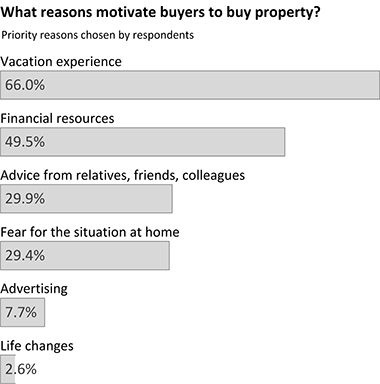
The second popular reason is available financial resources noted by half of survey participants (49.5%). This is indicative of the fact that Russians who have earned substantial money often prefer to invest it in overseas property. This trend is one experienced by Tranio.Ru: many buyers who come to us want to buy property as a reliable and justifiable investment.
A particularly important role of the financial factor is observed in Italy and Spain, where it was noted by 76.5% and 61.5% of the realtors respectively. It is less important in Germany and Montenegro (33.3%).
Third place is occupied by advice of relatives and friends. This reason was noted by 29.9% of survey participants. It is characteristic that only 7.7% of them reported traditional advertising among the reasons for buying property. Potential property buyers are much more likely to trust the recommendations of friends over advertising. This fact was traced in previous research conducted by Tranio.Ru, where we found that agencies rely on “word of mouth” rather than on advertising.
Tips from relatives and friends are particularly noted in Bulgaria and Germany (53.8% and 41.7% respectively). This factor affects property purchases in Italy least of all — only 5.9%.
Oleg Kazankov, owner of Rusky.Sk (Slovakia) said: “Russian buyers of overseas property behave unconventionally. Many people buy property relying on recommendations of friends and acquaintances, not on prices and prospects. For example, in Austria, Slovakia, or the Czech Republic, commission paid to brokers does not exceed 5% of the price of the object. In Bulgaria, intermediaries receive
Finally, another popular reason for buying property is fear about the political and economic situation in the buyer’s home country. This factor was mentioned by 29.4% of respondents. Its importance is extremely high for those who buy property in Germany and Latvia: in these countries, it was mentioned by 75.0% and 57.1% of the realtors respectively. Russian property buyers consider prosperous, conservative, and stable Germany as one of the most popular destinations in the event of forced emigration.
4.2. What features of foreign countries attract property buyers?
Favorable climate and weather conditions are the main things that attract buyers in foreign countries. Most respondents (70.8%) indicated climate and weather as the most attractive qualities of a foreign country. In Bulgaria, this factor was noted by all realtors; in Turkey, by almost all of them (89.3%).
Climatic conditions do not come in at first place only in Latvia and Germany, where they were given by 14.3% and 16.7% of respondents respectively. At the same time the main factor in Latvia was a good attitude toward
Favorable climate and weather conditions are the main things that attract buyers in foreign countries.
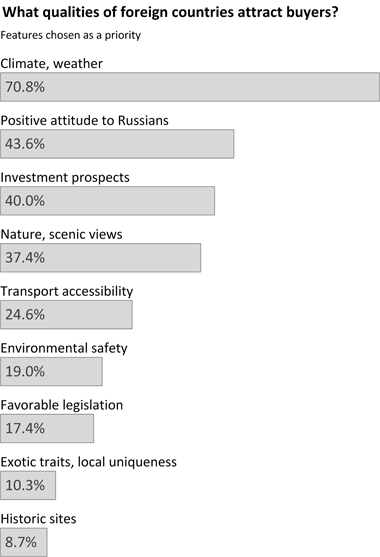
Other factors are much less important than the attractiveness of climate and weather. For example, a positive attitude toward
Investment prospects are among popular factors, as well (40.0%). In addition to Germany, they have a special significance in Turkey (53.6%). But in Bulgaria they play a relatively minor role (26.9%), while in Montenegro they occupied one of the last places — only 7.7%.
More than a third of respondents (37.4%) pointed out beautiful nature and scenic views as one of the most attractive features for buying. It is especially appreciated in Montenegro and Italy (76.9 and 76.5% respectively). On the other hand, in Bulgaria it was selected only by 23.1% and in Germany by 16.7% of the realtors.
Some respondents noted other attractive features:
- Transport accessibility (24.6%). This feature was especially noticeable in Latvia and Germany: in both countries it took the second place (42.9 and 50.0% respectively). These countries enjoy good transport links with Russia, and one can quickly reach them taking a flight from the airports of Moscow or St. Petersburg. There are also plenty of cheap flights.
- Environmental security (19.0%). Interestingly, this factor has a small value in Bulgaria and Italy. It was noted by only one participant in both countries, but in Germany it took the third place with 25.0% of votes.
- Favorable legislation (17.4%). This quality, as well as transport accessibility, is particularly pronounced in Latvia and Germany (42.9% and 58.3% respectively). On the contrary, it was not mentioned by any respondent in Italy and Montenegro. Italy is often characterized by excessive bureaucracy and complicated formal procedures.
Elena Mazur, Sales Consultant of Turk Home, commented: “In addition to low prices, one of the main factors that motivate people to buy recreational property in Turkey is its visa legislation. It plays a crucial role in choosing between Bulgaria and Turkey.”
Some respondents also pointed out low maintenance costs and servicing of housing (especially in Spain) as attractive factors, as well as exotic traits and local uniqueness, cultural and historic landmarks. Characteristically, the latter play an important role in Italy and Germany (29.4 and 16.7%). At the same time, Bulgaria and Latvia are countries where no one mentioned this factor.
4.3. What political and social factors are of importance?
We raised the question of what political and social living conditions in foreign countries are of the greatest importance to property buyers.
More than half of the respondents (52.1%) indicated personal safety and low crime rates as main factors. This factor is particularly noticeable in Montenegro, where it was registered by 84.6% of the respondents. In contrast, in Italy and Germany it is noticeably inferior to other factors (35.3% and 25.0% respectively).
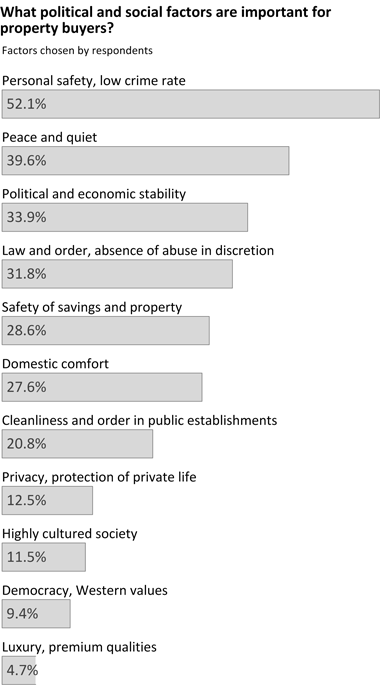
Second place is occupied by the factor of peace and quietness of life, this option was indicated by 39.6% of respondents.
In Bulgaria this factor falls in the first place (61.5%), confirming a reputation that the country is suitable for quiet life after retirement. On the contrary, peace and quietness were the least topical in Latvia and Germany, where they were indicated by 7.1% and 8.3% of respondents.
Among political and social factors, personal safety is especially important. In addition, many buyers appreciate peace and quiet,, as well as political and economic stability.
In Germany, political and economic stability falls in the first place, indicated by 83.3% of property sellers in this country. On average, in all the countries, this factor is in third place. It was noted by 33.9% of the respondents. It is noteworthy that stability is much less valuable in Latvia and Turkey (14.3% and 25.0% respectively).
Law and order, and an absence of abuse in discretion were indicated by 31.8% of survey participants. Most often, this factor was mentioned by realtors from Germany (50.0%); less often — from Montenegro (15.4%).
Finally, the top five political and social factors include safety of savings and property. It was reported by 28.6% of realtors with as much as 58.3% in Germany and just 7.7% in Montenegro.
Some respondents also mentioned domestic comfort (27.6%) and clean and tidy public establishments (20.8%). Both of these factors are especially noticeable in Turkey, where they were indicated by 53.6% and 35.7% of realtors respectively.
The list is closed by factors that were least often mentioned by respondents:
- Privacy, protection of private life (12.5%). In Italy, this factor plays a more prominent role compared to other countries and was mentioned by 29.4% of local realtors.
- Highly cultured society (11.5%). This option was not mentioned in Bulgaria, Turkey, and Montenegro. On the other hand, in some countries it doesn’t fall into this bottom category — for example, in Italy (35.3%), Spain (24.0%), and Latvia (21.4%).
- Democracy and Western values (9.4%). None of the respondents mentioned this factor in Turkey, Italy, Montenegro, and Germany. However, in Latvia, it took third place (35.7%).
Predictably and abstract values such as democracy or culture are of much less priority to buyers than practical ones such as personal safety and domestic comfort.
4.4. What infrastructure elements are important for buyers?
Unequivocally, shopping facilities and services are in the lead among preferred residential and social infrastructure elements: 60.7% of respondents indicated them as key features. Shopping facilities are particularly important in Spain, Latvia, and Italy, where this factor was indicated by 72.0%, 71.4%, and 70,6% of respondents respectively. Interestingly, in Bulgaria shops are referred to more often than they are on the average (69.2%), while in Turkey, by contrast, significantly less often (46.4%). The latter is probably due to the fact that
Health care services are in second place, indicated by 38.2% of survey participants. Only in Montenegro is this figure significantly below average — 25.0%.
Shopping facilities and delivery services are in the lead among residential and social infrastructure elements. The second place is occupied by health care services.
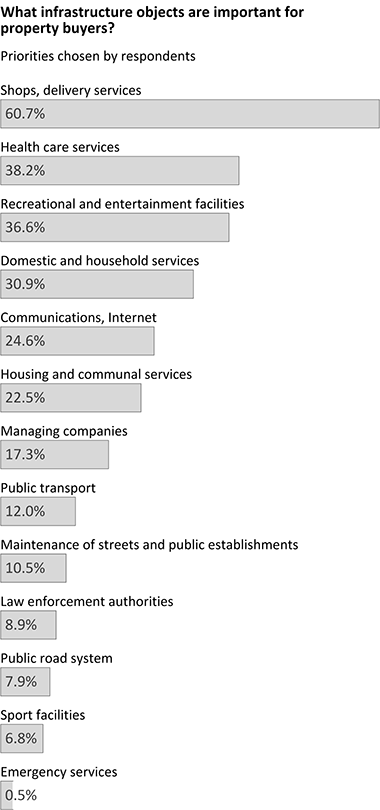
These features are followed by entertainment facilities (36.6%), especially noticeable in Latvia and Italy, where this option was indicated by 57.1% and 47.1% of the respondents. This factor is less important in Turkey (28.6%) and Montenegro (16.7%), and was not mentioned in Germany. Buyers largely come to Germany for business and work, so entertainment infrastructure in the country is not of great importance to them, compared to those who buy property in resort countries.

Domestic and household services (cleaning, laundry, repairs, etc.) were mentioned among priority features by 30.9% of realtors. Most often they were pointed out by respondents in Montenegro (50.0%) and Italy (47.1%), and least often in Germany (18.2%).
Other infrastructure facilities scored less than a quarter votes. They include communications and the Internet (24.6%), housing and communal services (22.5%) and managing companies (17.3%). In Germany, as many as 54.5% of respondents mentioned public transportation as a main favorable feature, which corresponds the interests of people who need to travel for business a lot.
Maintenance of streets and public establishments, sport facilities, and emergency services were mentioned in rare cases.
5. Buyers and sellers
5.1. How do sellers interact with buyers?
The main means of communication between property buyers and sellers is
Communication by telephone (39.2%) and personal meetings (35.9%) were mentioned among other methods.
Realtors say that in the initial stages of making a transaction they communicate with their clients mainly via
The main means of communication between property buyers and sellers is
Communicating by phone is particularly important in Latvia and Germany, where it was pointed out by 60.0% and 50.0% of respondents respectively. In Turkey, it was chosen just by 23.3%. In Montenegro, a lot of the respondents (53.3%) noted the importance of personal meetings, while in Germany this kind of communication was referred to by just 14.3% of respondents.
The last place in the list of channels of communication (19.8%) is occupied by instant communications services (Skype, ICQ, and others). Their priority is above average in Turkey (43.3%) and Spain (35.7%), and below average in Bulgaria (6.7%). If these services are used, negotiations with the use of text messages prevail (this option was chosen by 41.9% of the respondents). Some respondents use voice communication (34.9%) and video calls (23.3%).
5.2. Why do people choose not to buy property?
Why do our fellow citizens, willing to buy overseas property, drop the idea to do so? Survey participants noted that it is often difficult to find out the real reasons for a client's change of heart. They prefer to reduce their explanations to short replies such as putting off the idea until better times come.
However, when the cause is revealed, most often it is purchasing a property from another seller, indicated by 46.0% of respondents. This percentage is particularly high in Turkey (66.7%) and Latvia (61.5%).
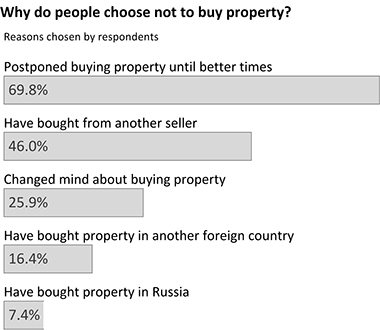
The second most popular reason is the fact that buyers generally change their minds about buying properties. This option was mentioned by 25.9% of respondents. A slightly smaller share of respondents (16.4%) reported that their clients "withdraw" because they have bought property in another foreign country. This reason is most often referred to in Italy (37.5%) and almost never referred to in Bulgaria. This is not surprising since the budget sufficient for purchasing property in Bulgaria is too low for buying it in other countries.
Certain realtors, especially in Spain, noted that a common reason for failure to make a deal is that banks do not issue mortgage loans. In falling markets, some buyers put off buying property because they prefer to wait for further price reductions.
Finally, the least popular reason (7.4%) was the fact that buyers have purchased property in Russia instead of foreign countries.
This report was compiled by the Tranio.com team:
- Rostislav Chebykin, Editor in Chief
- George Kachmazov, Tranio managing partner
We will send you a content digest not more than once a week